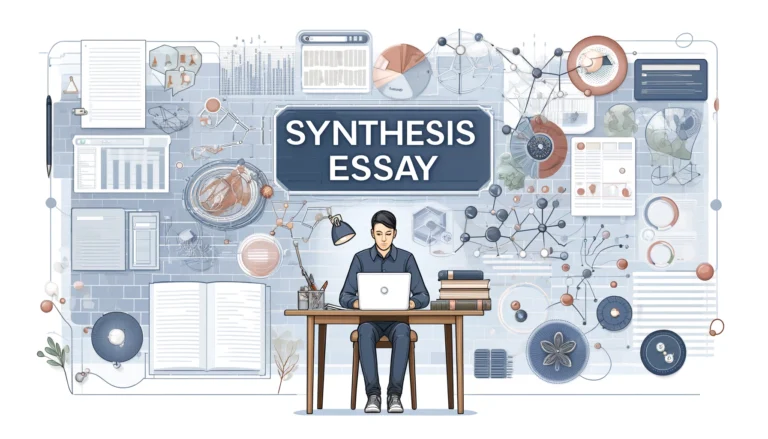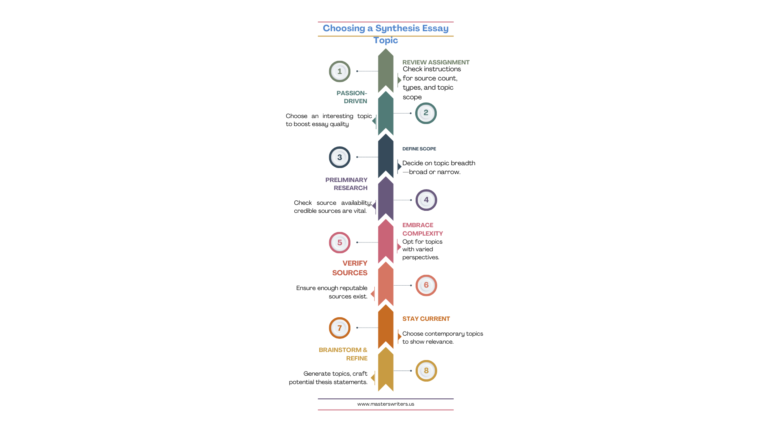Essay Writing Guides
How to Write a Synthesis Essay: A Comprehensive Guide with Examples


Writing a synthesis essay can seem daunting, but it can become a straightforward and rewarding process with the proper guidance and understanding. A synthesis essay requires the writer to combine information from multiple sources to present a coherent and well-supported argument or explanation. Unlike a simple summary, synthesis involves critical thinking and analysis, requiring the writer to draw connections between different ideas and perspectives. This comprehensive guide aims to demystify the synthesis essay process, offering step-by-step instructions, practical examples, and useful tips to help you master this essential academic skill.
This article will delve into various aspects of writing a synthesis essay, starting with a clear definition and the differences between explanatory and argumentative synthesis essays. We will then explore the structure of a synthesis essay, how to choose an appropriate topic and provide a detailed breakdown of the writing process in five easy steps. Additionally, you will find a synthesis essay example to illustrate the concepts discussed, along with expert tips to enhance your writing. To ensure all your questions are answered, we have included a comprehensive FAQ section covering common inquiries, such as the format of a synthesis paper and how to demonstrate synthesis in your essay effectively. By the end of this guide, you will be equipped with the knowledge and tools needed to craft a compelling and well-organized synthesis essay.
What is a Synthesis Essay?
A synthesis essay is a type of writing that requires the integration of information from various sources to form a cohesive, well-argued, and insightful piece. Unlike a simple summary that merely recounts information, a synthesis essay involves analyzing different viewpoints, drawing connections, and presenting a unified argument or explanation. This type of essay often addresses complex topics, demanding the writer to engage with the material critically, evaluate the credibility of sources, and synthesize diverse perspectives into a coherent narrative. A synthesis essay demonstrates the writer’s ability to understand and convey intricate ideas by weaving together information from multiple texts, making it a valuable skill in academic and professional settings.
Explanatory vs. Argumentative Synthesis Essays
When it comes to synthesis essays, understanding the distinction between explanatory and argumentative types is crucial. An explanatory synthesis essay aims to inform and explain a particular topic to the reader. It involves presenting facts, data, and perspectives from various sources to understand the subject matter comprehensively. The writer’s role is to objectively convey the information without inserting personal opinions or attempting to persuade the reader. This type of essay is often used to clarify complex topics, making them accessible and understandable to the audience.
In contrast, an argumentative synthesis essay presents information and takes a clear stance on the issue. The writer must construct a compelling argument, supported by evidence from multiple sources, to persuade the reader of a particular viewpoint. This involves critically analyzing the sources, identifying the most relevant information, and weaving it into a cohesive argument that addresses potential counterarguments. An argumentative synthesis essay aims to convince the reader of the validity of the writer’s perspective, making it a more dynamic and persuasive form of writing.

Synthesis Essay Writing Giving You Headaches?
Save yourself from unnecessary trouble, and let us take care of all your work for you!
Synthesis Essay Structure
The structure of a synthesis essay is fundamental to presenting a clear, logical, and cohesive argument or explanation. A well-organized synthesis essay typically follows a standard format, which includes an introduction, body paragraphs, and a conclusion.
- Introduction: The introduction sets the stage for your essay. It should begin with a hook to capture the reader’s interest, followed by background information. The introduction should clearly state the essay’s purpose and present the thesis statement, the central argument, or the main point that will be developed throughout the essay. This thesis should succinctly convey the synthesis of ideas from your sources.
- Body Paragraphs: The synthesis essay’s body is where the information synthesis occurs. Each body paragraph should focus on a single idea or aspect of the topic, supported by evidence from multiple sources. Start each paragraph with a topic sentence that introduces the main idea. Then, present your evidence, including quotes, paraphrases, or summaries from your sources. Analyzing and interpreting the evidence and showing how it supports your thesis are essential. Additionally, make connections between the sources, highlighting similarities differences, and how they contribute to your overall argument. Transition sentences between paragraphs should ensure a smooth flow of ideas.
- Conclusion: The conclusion should summarize the synthesis essay’s main points and restate the thesis in light of the evidence presented. It should synthesize the information discussed in the body paragraphs, demonstrating how they collectively support your argument. The conclusion should also provide a final insight or reflection on the topic, leaving the reader with a lasting impression. Avoid introducing new information in the conclusion, as this can confuse the reader and dilute the impact of your essay.
By adhering to this structured format, you can effectively organize your thoughts, present a balanced synthesis of information, and create a compelling and cohesive essay.
Picking a Synthesis Essay Topic
Picking essay topics is just the beginning. To write a great synthesis essay, you should carefully evaluate and connect different sources to build a strong argument or viewpoint. Here’s a step-by-step infographic guide to help you choose the right synthesis essay topics wisely. This guide will walk you through crucial steps such as reviewing assignment guidelines, conducting preliminary research, ensuring source credibility, and more. Following these steps, you can select an exciting and rich topic with diverse perspectives, setting a solid foundation for a compelling synthesis essay.

How to Write a Synthesis Essay in 5 Easy Steps
- Understand the Prompt and Purpose
- Carefully read the synthesis essay prompt to understand what is being asked of you. Determine whether the synthesis essay is explanatory or argumentative, which will influence your approach. Clearly define the purpose of your essay, which will guide your research and writing process.
- Conduct Thorough Research
- Gather information from credible sources relevant to your topic. Aim for a diverse range of perspectives to provide a balanced view. Take detailed notes and organize the information in a way that allows you to see connections and contrasts between the sources. Ensure you understand the context and arguments of each source.
- Create a Strong Thesis Statement
- Develop a clear and concise thesis statement that encapsulates your synthesis essay’s main argument or point. This statement should reflect the synthesis of ideas from your sources and provide a roadmap for your essay. A strong thesis will help you stay focused and ensure all parts of your essay contribute to your central argument.
- Draft an Outline
- Organize your research and thoughts into a structured outline. Start with an introduction that includes your thesis statement. Plan body paragraphs that each focus on a specific aspect of your thesis, supported by evidence from your sources. Ensure each paragraph has a clear topic sentence, relevant evidence, analysis, and a connection to your thesis. Conclude with a summary that reinforces your main points and thesis.
- Write and Revise Your Essay
- Begin writing your essay based on the outline. Focus on presenting your ideas clearly and logically, using evidence from your sources to support your arguments. After completing the draft, revise it for clarity, coherence, and consistency. Check for logical flow and ensure each paragraph transitions smoothly to the next. Edit for grammar, punctuation, and style. Finally, ensure all sources are correctly cited according to the required format.
By following these five steps, you can effectively write a synthesis essay that is well-organized, insightful, and persuasive.
Synthesis Essay Examples
Synthesis Essay Tips
Writing a synthesis essay can be challenging, but with the right approach and strategies, you can create a compelling and well-organized piece. Here are some essential tips to help you excel in writing a synthesis essay:
- Understand Your Sources
- Before you begin writing, make sure you thoroughly understand the sources you will be synthesizing. Take detailed notes, highlighting key points, arguments, and evidence. Look for connections and contrasts between the sources to identify common themes or divergent viewpoints.
- Develop a Clear Thesis Statement
- Your thesis statement is the backbone of your synthesis essay. It should succinctly convey the main argument or point you will be making based on your synthesis of the sources. Ensure that your thesis is specific, debatable, and reflects the synthesis of ideas from multiple sources.
- Organize Your Essay Effectively
- A well-structured essay is crucial for clarity and coherence. Use a clear and logical organizational pattern. Typically, a synthesis essay includes an introduction, body paragraphs, and a conclusion. Each body paragraph should focus on a single idea or theme, supported by evidence from multiple sources. Ensure smooth transitions between paragraphs to maintain the flow of your argument.
- Use Strong Topic Sentences
- Begin each body paragraph with a strong topic sentence that clearly states the main idea of the paragraph. This helps to keep your writing focused and guides the reader through your argument. Each topic sentence should relate directly to your thesis statement.
- Balance Your Sources
- Avoid relying too heavily on a single source. Instead, aim to balance your use of sources, incorporating evidence from multiple perspectives. This not only strengthens your argument but also demonstrates your ability to synthesize diverse viewpoints. Use a mix of direct quotes, paraphrases, and summaries to integrate evidence effectively.
- Analyze, Don’t Just Summarize
- While it is essential to present information from your sources, your synthesis essay should go beyond mere summarization. Analyze the evidence, explaining how it supports your thesis and relates to other sources. Highlight similarities, differences, and the significance of these relationships to your overall argument.
- Be Objective and Fair
- Maintain an objective tone throughout your essay, even if you are presenting an argumentative synthesis. Address counterarguments and opposing views fairly, providing evidence to refute them where necessary. This balanced approach strengthens your credibility and the persuasiveness of your essay.
- Use Proper Citation
- Properly cite all the sources you use in your essay to avoid plagiarism and give credit to the original authors. Follow the required citation style (e.g., APA, MLA, Chicago) consistently. Include in-text citations and a comprehensive reference list at the end of your essay.
- Revise and Proofread
- After completing your first draft, take the time to revise and proofread your essay. Check for clarity, coherence, and consistency. Ensure that your argument flows logically and that each paragraph supports your thesis. Pay attention to grammar, punctuation, and spelling errors. Revising and proofreading help to polish your essay and enhance its overall quality.
- Seek Feedback
- If possible, seek feedback from peers, instructors, or writing centers. External perspectives can provide valuable insights and help identify areas for improvement. Use the feedback to refine your essay and strengthen your argument.
By following these tips, you can effectively write a synthesis essay that is clear, cohesive, and compelling. Remember to stay organized, balance your sources, and focus on analysis to create a well-rounded and persuasive piece.
Final Words
Writing a synthesis essay involves integrating information from various sources to present a well-supported and cohesive argument or explanation. Understanding the nature of a synthesis essay, distinguishing between explanatory and argumentative types, organizing your essay effectively, and utilizing various tips and strategies can significantly enhance the quality of your writing. By carefully selecting and synthesizing relevant sources, developing a clear thesis statement, and maintaining a balanced and objective tone, you can craft a compelling synthesis essay that effectively communicates your ideas.

Essay Deadline Just Around the Corner?
Streamline the writing progress with our expert service!
FAQs
What is a synthesis essay?
A synthesis essay is a type of writing that combines information from multiple sources to present a cohesive argument or explanation on a given topic. The writer analyzes various perspectives, integrates them, and synthesizes the information to support a central thesis or main point. Unlike a summary, a synthesis essay involves critical thinking and demonstrates the writer’s ability to understand and link different ideas to form a comprehensive narrative.
How to write a synthesis example?
Writing a synthesis example involves several steps:
- Select Your Sources: Choose relevant and credible sources that offer different perspectives on your topic.
- Read and Annotate: Carefully read your sources, taking notes and highlighting key points, arguments, and evidence.
- Develop a Thesis Statement: Formulate a clear and concise thesis that reflects the synthesis of ideas from your sources.
- Organize Your Essay: Create an outline to organize your main points and evidence. Typically, this includes an introduction, body paragraphs, and a conclusion.
- Write the Essay: Start with an introduction that presents your thesis and provides context. Each body paragraph should focus on a specific aspect of your thesis, supported by evidence from your sources. Conclude by summarizing your main points and reiterating how they support your thesis.
- Cite Your Sources: Properly cite all the sources you use in your essay to give credit to the original authors and avoid plagiarism.
What is the format of a synthesis paper?
The format of a synthesis paper typically follows a standard academic structure:
- Introduction:
- Begin with a hook to grab the reader’s attention.
- Provide some background information on the topic.
- Present your thesis statement, which reflects the synthesis of your sources.
- Body Paragraphs:
- Each paragraph should focus on a single idea or theme related to your thesis.
- Start with a topic sentence that introduces the main idea of the paragraph.
- Include evidence from your sources to support the main idea.
- Analyze and interpret the evidence, showing how it supports your thesis.
- Use transition sentences to ensure a smooth flow between paragraphs.
- Conclusion:
- Summarize the main points discussed in the body paragraphs.
- Restate your thesis in light of the evidence presented.
- Provide a final insight or reflection on the topic.
- References:
- Include a reference list with all the sources you cited in your essay, formatted according to the required citation style (e.g., APA, MLA, Chicago).
How do you show synthesis in an essay?
Showing synthesis in an essay involves integrating information from multiple sources to support your thesis. Here are some strategies:
- Compare and Contrast: Highlight similarities and differences between the sources to show how they relate to your thesis.
- Identify Themes: Draw connections between recurring themes or ideas across your sources.
- Analyze Relationships: Explain how different pieces of evidence from various sources work together to support your argument.
- Use a Balanced Approach: Incorporate evidence from multiple sources rather than relying heavily on one, demonstrating a comprehensive understanding of the topic.
- Critical Evaluation: Critically assess the strengths and weaknesses of the sources and explain their relevance to your thesis.
- Smooth Transitions: Use transition sentences to connect ideas from different sources, ensuring a coherent and logical flow in your writing.

